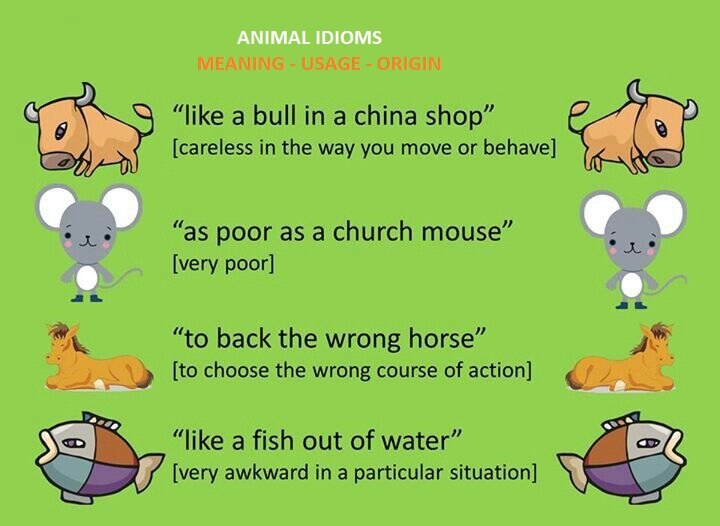Animal Idioms in English & Idiom Origins
These animal idioms have a lot of history behind them. Check their meaning, usage and origins.

Bark is worse than your bite
Meaning
Sounding more frightening than you actually are.
Origin
This saying originates in the 17th Century when dogs kept as pets simply guarded houses, and a dog that barked really fiercely always sounded like he would bite a bit off you. But if the dog didn’t really bite, then it was said that his bark was worse than his bite!
Birds of a feather flock together
Meaning
People who have common interests or habits are usually together.
Usage
All my friends have the same interests and like to go hiking. I guess we are like birds of a feather flocking together!
Origin
This is a saying that has been used by man for more than 2000 years. If you observe carefully, you will find that birds of one kind always fly together. You never see a crow flying with pigeons, do you?

Check also:
100+ Commonly Used English Idioms (PDF+MP3)
Country-Related Idioms and Phrases in English
Black sheep of the family
Meaning
The most different or odd one out in a group or a family.
Usage
As David does not study hard like his other brothers he is considered the black sheep of his family.
Origin
The colour black is associated with evil and a sheep that is all black is rare, especially in a herd of all-white sheep. So a black sheep in a white herd is definitely the odd one out. In the early 1800’s, shepherds thought that black sheep scared off the white ones and therefore favoured them less. Slowly, this saying came to refer to the least favoured person in a family or group.
Bull in a China shop
Meaning
To be extremely clumsy.
Usage
Whenever Roy is in the kitchen he breaks something, so his mother says that he’s like a bull in a china shop!
Origin
Bulls are clumsy creatures, large and graceless. When they move they always knock things out of their way.
This idiom found its way into speech when dishes and plates made out of China (porcelain) were introduced in Europe in the 16th Century.
A leopard cannot change his spots
Meaning
We cannot change the nature of things.
Usage
Mr. Wilson could not yell at Fred for stealing his mangoes because he is a very gentle and forgiving person. This instance portrays that Mr. Wilson was like a leopard who cannot change his spots.
Origin
The saying originates from the ‘Bible’. In the book of Jeremiah, there is a verse which says ‘Can the Ethiopian change his skin or the leopard change his spots?’ which means that the basic nature of things does not change, even with changed circumstances?
you may want to check this ☛ COMMONLY USED ENGLISH IDIOMS
Crocodile tears
Meaning
False or fake tears.
Usage
Peter fell down but did not hurt himself. He cried crocodile tears only because he wanted his dad to buy him something.
Origin
Have you ever seen a crocodile crying? I’m sure you haven’t! Therefore anyone who is crying crocodile tears is just pretending.
Cry wolf
Meaning
False warning about a danger that is not real.
Usage
My brother points to the sky and says he can see rockets flying which are going to crash onto the earth. But none of us ever look up because we know he is crying wolf.
Origin
Aesop, the famed Greek storyteller, told a story about a shepherd boy who would fool his friends by saying that a wolf had come to eat their sheep. After a few times, when his friends realised that he was playing the fool they stopped believing him. One day the wolf really came. The shepherd boy cried out for help but they thought he was just trying to fool them again and so did not run to help him and all the sheep were eagerly devoured by the wolf.
Don’t look a gift horse in the mouth
Meaning
Don’t complain if a gift is not up to your expectation.
Usage
When Aunt Lara bought Cynthia a beautiful dress, she said she didn’t like dresses with frills. I really think she shouldn’t look a gift horse in the mouth.
Origin
In the olden days, when horses were used for more than just riding, people would examine their teeth to check whether it was a young strong horse or an old one. But if you were gifted a horse by someone and you examined its teeth by looking at its mouth, then you would be hurting the feelings of the person who gifted it to you. In other words, it is better not to be too choosy or fuss about anything that comes to you as a gift.
Eager Beaver
Meaning
Hardworking, industrious.
Usage
Johnny always finishes his schoolwork before going out to play. In this aspect, Johnny is an eager beaver.
Origin
For many centuries man has admired the beaver for its hard working nature. The beaver swims in rivers and builds dams made of tiny wooden sticks across
them. Come rain or shine, the beaver is always hard at his work. This saying became popular in the 17th Century.

Go to the dogs
Meaning
To be ruined, to fall from a great position.
Usage
Our rich neighbour’s fortune went to the dogs when his son spent all his money.
Origin
In the medieval times, food that was spoilt or considered unfit for man, was given to the dogs. Soon man started ascribing this state to his fellow beings, to indicate that a person’s state had become very bad, like that of a dog.
Hold your horses
Meaning
Slow down, be patient.
Usage
When I am impatiently eating the ice cream, Grandpa tells me to hold my horses.
Origin
Horse carts were used for travel in 19th Century America. When you wanted the cart driver to slow down, you had to tell him to rein in his steeds, in other words, “Hold your horses.” Soon this expression came to be applied to life too, and if you want anybody to slow down or be a little patient all you need to say is “Hey! Hold your horses!”
Let the cat out of the beg
Meaning
To give away or let out a secret.
Usage
We were planning to bake a cake as a surprise for my mother’s birthday, but little Tim told my mother and let the cat out of the bag.
Origin
This is what happened in a market many centuries ago in England. A favourite country trick used to be to substitute a cat for a pig at markets. If
you let the cat out of the bag, you disclosed the trick and people avoided buying the pig. From then on, if anybody let the cat out of the bag, it was said that they were spilling a secret!
Make a mountain out of a molehill
Meaning
To make anything sound or look larger than it actually is.
Usage
When Uncle Benny catches a cold he says he has a raging fever. He’s always making a mountain out of a molehill.
Origin
This saying originated in ancient Greece but not in its present form. When people began using it in England much later, they put in the words beginning with ‘m’ just so
that it would be easy to remember and fun to use.
Monkey business
Meaning
Fooling around, silly behaviour.
Usage
When Harry was fooling around in class, the teacher looked sternly at him and said, “No more monkey business young man, or you will be out of the class!”
Origin
Have you seen a monkey? It always jumps around and acts like it is mad. Nobody knows where this saying comes from but to understand its meaning just look at a monkey.
Raining cats and dogs
Meaning
To rain very heavily.
Usage
Johnny cannot go out to play today
because it is raining cats and dogs.
Origin
In the 17th Century in England, there were heavy rainstorms and sometimes cats and dogs would drown and would be found lying dead on the roads after the rains. It almost looked like it had been raining cats and dogs.

Rate abandoning a sinking ship
Meaning
Disloyal people.
Usage
When the company started to lose money, the employees resigned and left like rats abandoning a sinking ship.
Origin
In the 16th Century sailors had many superstitions. One of them was that if you saw rats leaving a ship when it was docked in the harbour, it meant that the ship would drown on its journey. In the sailors’ minds the rats were supposed to be loyal to the ship, as it had provided them with a home and food. Anyone who changes sides or becomes disloyal is therefore referred to as a rat abandoning a sinking ship.
Smell a rat
Meaning
To be suspicious or get a feeling that something is wrong.
Usage
On observing the thief’s actions, the policeman smelt a rat and realised that the thief was lying and up to something foul.
Origin
This saying was used as early as the 16th Century. Man has always considered rats as dirty, smelly creatures. Even a cat, which suspects that a hole is occupied, wil
smell to see if it houses a rat. Soon this practice of the cat caught on to imply that if you sniff out something bad, you could “smell a rat”!
Catch the bull by its horns
Meaning
To be brave in a frightening or dangerous situation.
Usage
Jeremy caught the bull by its horns when he dived into the well to save the drowning dog.
Origin
Sometimes at the end of a bullfight the bullfighter will wrestle the bull by taking hold of its horns. A very brave and daring act indeed! This saying therefore, originated from the land of bullfights, i.e. Spain!
Wolf in sheep’s clothing
Meaning
Someone who looks harmless but may actually be very dangerous.
Usage
Never trust strangers on the street, for they may be wolves in sheep’s clothing!
Origin
In a story by Aesop, the famous Greek storyteller, a hungry wolf killed a sheep and wore its skin to get to the flock of sheep and kill some more. The sheep all thought that the wolf was also one of them. The dangerous wolf hid under the sheep’s skin and managed to fool the flock!
Everyday Idioms for Daily Life PDF – (download)



